The 8 Unhealthiest Protein Powders You Can Buy Right Now
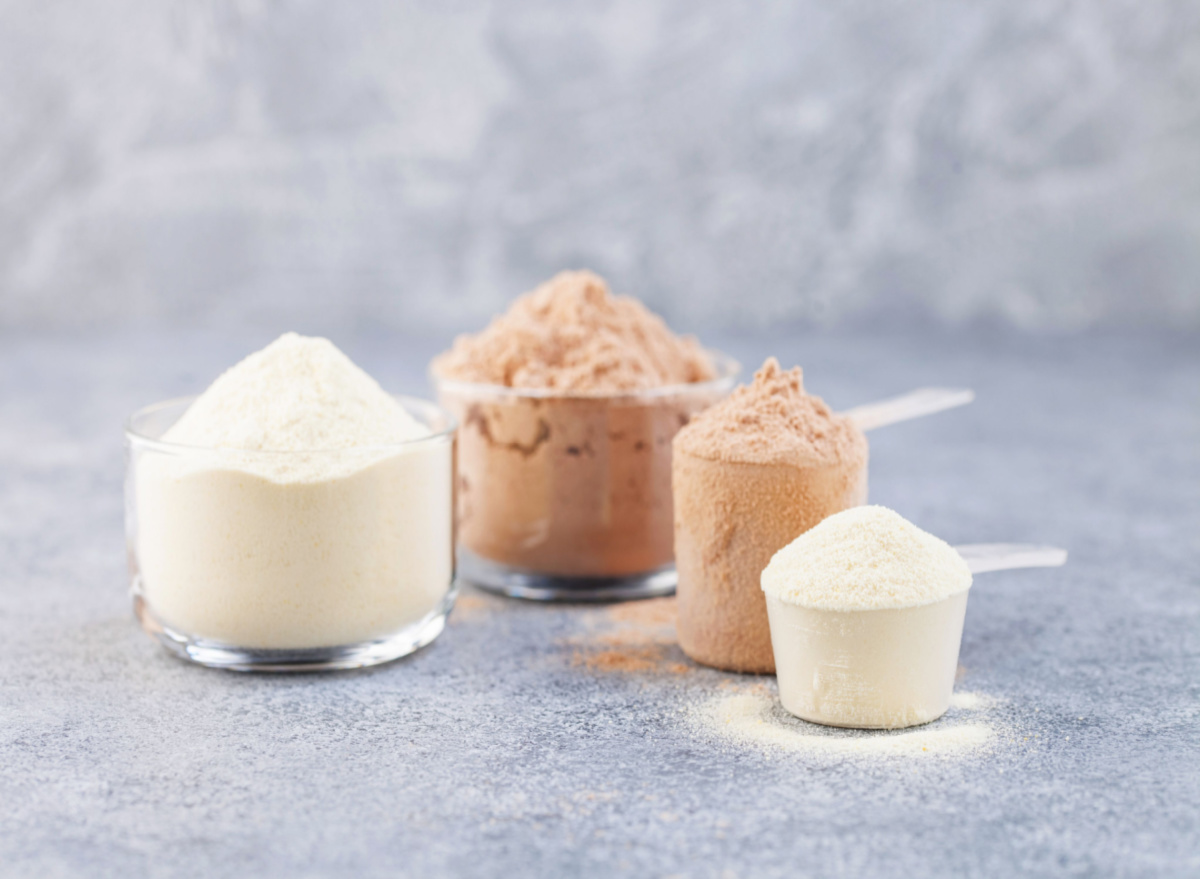
Protein powder is a popular way to boost protein intake, supporting workouts, weight management, and overall health. While many powders deliver the extra protein you’re looking for, not all protein powders are nutritionally equal. Some powders contain extra sugar, additives, and ingredients you may not want in a supplement.
When shopping for a protein powder, it’s important to look beyond grams per scoop. Check out the entire Nutrition Facts label, especially the ingredients list. Remember, these powders are supplements, not replacements for real food. Opt for products with fewer ingredients,no added sugar, and few artificial ingredients.
We found eight protein powders on grocery store shelves that deviate from the qualities we look for in a supplement and may not want to add to your cart.
Body Fortress Super Advanced Whey Protein Powder Cookies & Cream
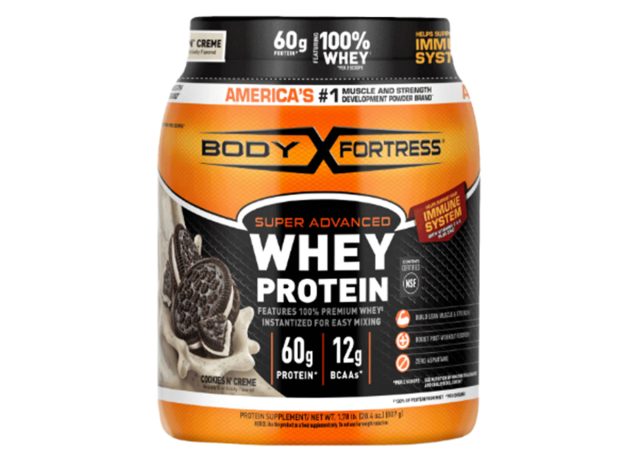
Calories: 190
Fat: 4 g (Saturated Fat: 2.5 g)
Sodium: 160 mg
Carbs: 7 g (Fiber: 0 g, Sugar: 4 g)
Protein: 30 g
Body Fortress’s Super Advanced Whey Protein Powder offers a hefty 30 grams of protein per scoop, making it seem like the perfect choice for muscle building. However, the protein boost comes with a side of preservatives, fillers, and artificial ingredients commonly found in ultraprocessed foods, nutrient-poor foods linked to obesity, heart disease, and gastrointestinal disorders.
The protein powder is also calorie- and carb-heavy and may lead to unwanted weight gain if you don’t modify your workout or eating plan to compensate for the extra energy. Further, the Body Fortress protein powder has the highest amount of saturated fat on our list, meeting 13% of the daily recommended needs. High saturated fat intake can elevate blood cholesterol levels, increasing risk of heart disease and stroke.
Optimum Nutrition Gold Standard Plant Protein Rich Chocolate Fudge
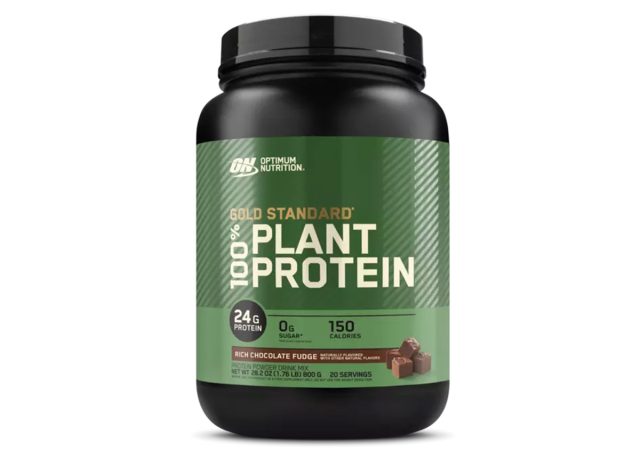
Calories: 150
Fat: 3.5 g (Saturated Fat: 2 g)
Sodium: 540 mg
Carbs: 6 g (Fiber: 2 g, Sugar: 0 g)
Protein: 24 g
Recent studies show that eating more plant proteins are good for your heart, gut, and weight, leading you to believe that the plant-based protein powders make a healthier choice. But sodium and saturated fat in Optimum Nutrition Gold Standard Plant Protein may cancel out potential benefits you may get from the plant proteins.
We like that the supplement uses a plant protein blend to improve amino acid balance, but it contains 540 milligrams of sodium, over 20% the daily limit. Getting too much sodium may lead to high blood pressure and increase risk of heart disease and stroke. Americans already consume more sodium than recommended from food and may not think about sodium content in a supplement.
Optimum Nutrition’s plant protein powder uses coconut oil as a source of fat, meeting about 10% of the daily value (DV). Though early research suggests the saturated fat in coconut oil doesn’t raise cholesterol like saturated fat in butter, health experts recommend limiting intake since little is known about how it may affect risk of cardiovascular disease.
Seeq Fruit Punch Clear Protein
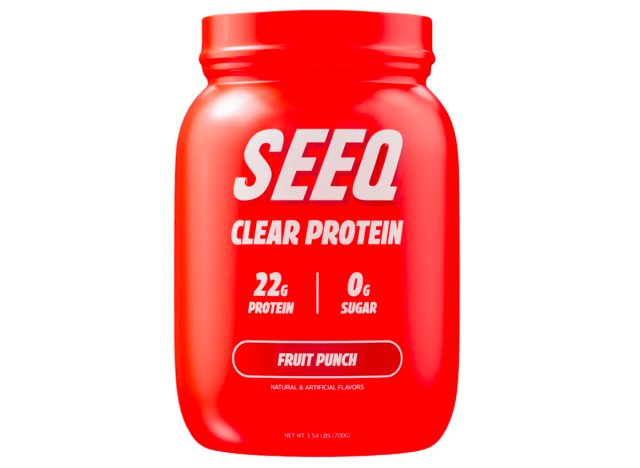
Calories: 100
Fat: 0 g (Saturated Fat: 0 g)
Sodium: 15 mg
Carbs: 1 g (Fiber: 0 g, Sugar: 0 g)
Protein: 22 g
If you prefer a juice-like protein drink, Seeq Clear Protein might catch your eye. With tasty flavors like fruit punch, strawberry lemonade, and blue razz freeze, this protein powder quenches and boosts protein intake. It’s also fat-free and low-carb.
But, Seeq includes silicone and polysorbate 80, synthetic food additives generally recognized as safe. However, the effects of long-term excessive intake of these food additives is unknown.
Regulatory agencies like the FDA require food makers follow a controlled production process when using additives like silicone. However, the FDA doesn’t oversee or test dietary supplements like food, leaving it up to the manufacturer to ensure safety for the consumer. Choosing supplements with more natural ingredients may reduce exposure and potential risk.
Quest Vanilla Milkshake Whey Protein Powder
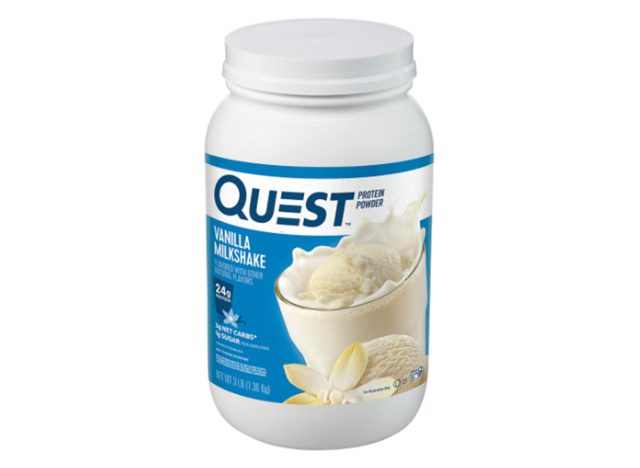
Calories: 110
Fat: 0 g (Saturated Fat: 0 g)
Sodium: 105 mg
Carbs: 3 g (Fiber: 0 g, Sugar: 1 g)
Protein: 24 g
Quest Nutrition products are a grocery store staple, but their Vanilla Milkshake Whey Protein Powder contains ingredients you may not want in a supplement like carrageenan, a food additive that helps the powder mix better with liquids. Though recognized as safe by the FDA, animal studies indicate that carrageenan may negatively affect gut health and increase risk of inflammatory bowel diseases.
The Quest Nutrition protein powder also contains erythritol, a sugar alcohol associated with an increased risk of heart attack and stroke. A 2023 cohort study published in Nature Medicine found that people with higher blood levels of erythritol were more likely to develop blood clots and at greater risk of having a cardiovascular event. More research is needed, but limiting intake of the sugar alcohol may benefit heart health.
SixStar 100% Whey Protein Strawberry Smoothie
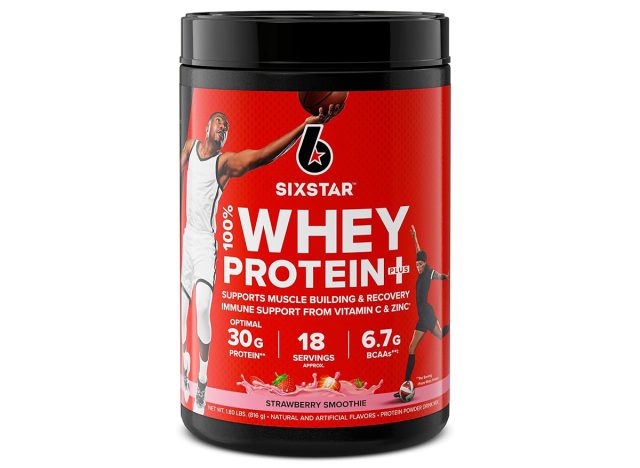
Calories: 170
Fat: 2.5 g (Saturated Fat: 1.5 g)
Sodium: 170 mg
Carbs: 8 g (Fiber: 0 g, Sugar: 2 g)
Protein: 30 g
SixStar 100% Whey Protein is another high-protein supplement designed for muscle building, packing in 30 grams of protein per scoop. But it contains a long list of questionable ingredients, including the artificial sweeteners sucralose and acesulfame potassium (AceK).
Artificial sweeteners improve flavor and limit sugar, carbs, and calories in the supplement. People use the calorie-free sweeteners to support weight management and reduce risk of weight-related health conditions like Type 2 diabetes and heart disease. However, research suggests that the calorie-free sweeteners may not help with weight management or reduce risk of disease.
Muscle Milk 100% Whey Protein

Calories: 130
Fat: 2 g (Saturated Fat: 1 g)
Sodium: 160 mg
Carbs: 3 g (Fiber: 0 g, Sugar: 2 g)
Protein: 25 g
Muscle Milk 100% Whey Protein contains fewer ingredients than other grocery store supplements, but it still uses artificial sweeteners and flavors. It contains.protease and bromelain, digestive enzymes that may reduce gastrointestinal side effects like gas and bloating.
Protein powders may contain added active ingredients, like digestive enzymes, that affect the body or interact with medication and something to keep in mind when shopping for a supplement. Talk to your doctor or a registered dietitian for individualized recommendations and guidance.
Ghost Whey Nutter Butter
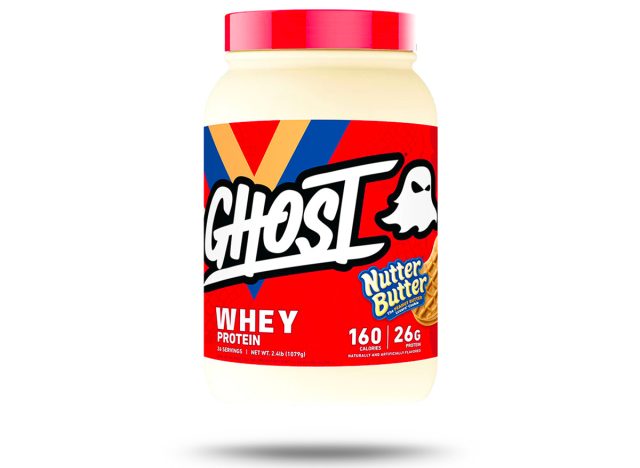
Calories: 160
Fat: 2.5 g (Saturated Fat: 1 g)
Sodium: 270 mg
Carbs: 8 g (Fiber: 1 g, Sugar: 3 g)
Protein: 26 g
Gone are the days of protein powder flavors limited to two options: chocolate or vanilla. Ghost Whey stands out with many fun flavors inspired by popular treats, including Nutter Butter, Oreo, and Chips Ahoy!. While these flavors may make it easier for you to enjoy your post-workout drink, the trade-off is added sugar and artificial ingredients.
The Nutter Butter protein powder from Ghost lists three sugars in the ingredients — sugar, corn syrup solids, and high fructose corn syrup, supplying 2 grams of added sugar (4% of the DV). It also contains artificial flavors and sweeteners.
Equate Plant-Based Protein Supplement
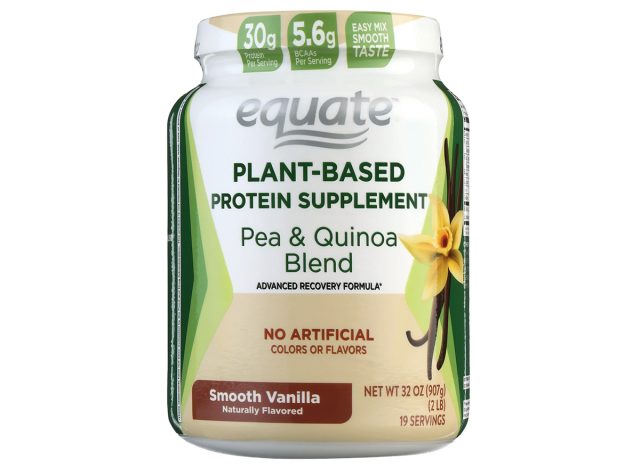
Calories: 190
Fat: 4 g (Saturated Fat: 1 g)
Sodium: 490 mg
Carbs: 6 g (Fiber: unknown, Sugar: unknown)
Protein: 30 g
Walmart’s Equate Plant-Based Protein is an affordable option with a straightforward ingredient list. However, its high sodium content — 490 milligrams — meets more than 20% of your daily sodium limit. It also contains carrageenan and sucralose.
Choosing the best protein powder for you depends on many factors, including nutrition goals, budget, and taste preferences. However, protein powders with added sugar, artificial ingredients, and overly processed formulas make a less than idea choice for health-conscious consumers.







